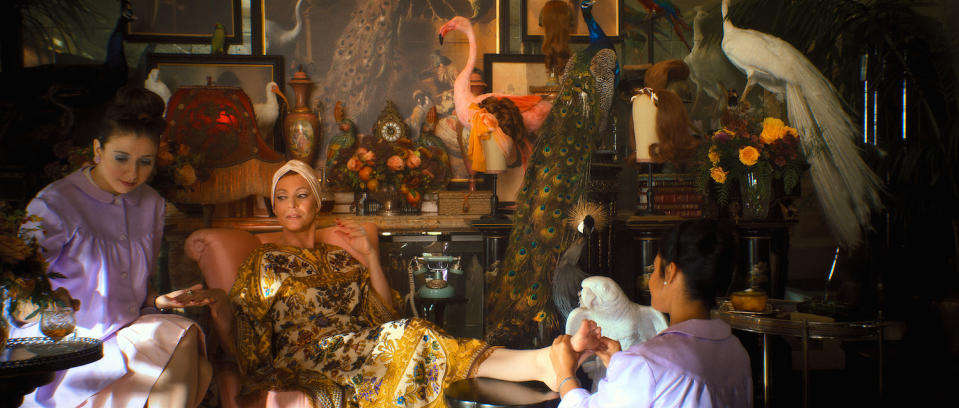‘Palm Royale’ Review: Kristen Wiig’s Chic ’60s Comedy Series Is a Resplendent Romp


“Why do you want to be where you’re not wanted?”
Posed by Linda Shaw (Laura Dern) — a proud hippie of the ’60s recently accused of “dressing like an indigent Mennonite railway priestess” — this question rests at the center of “Palm Royale,” alongside its recipient, Maxine Simmons (Kristen Wiig). The 40-something new kid in town insists to everyone she meets they use her married name, D’ellacourt, in the hopes its notoriety around Palm Beach will help hasten her acceptance there. Maxine wants nothing more than to be a member of high society, rubbing elbows with the movers and shakers at South Florida’s glam parties and opulent benefits, and she knows looking the part is just as important as living it. To her benefit: She is, in fact, a D’ellacourt. She is not, however, as wealthy as the minted moniker suggests, which proves a recurring impediment in her quest for respect from the rich and (regionally) famous.
More from IndieWire
But why, oh why, does Maxine want to be among the snobbiest, shallowest, most self-involved people in her new neck of the woods anyway? Why bother fighting for a seat at the table when your table-mates just want to rip your overpriced stool out from under you? Why does she want to be where she’s not wanted?
“Isn’t that what makes it revolutionary?” Maxine says.
This answer, delivered in the second episode of Abe Sylvia’s charming hourlong comedy, doesn’t explain everything. It’s not meant to — not yet. But over 10 episodes of “Palm Royale,” Maxine’s motivations crystallize, and her nifty quip becomes true. The splashy, ’60s-set series revels in its many twists. The extraordinary cast establishes themselves as both exorbitant comic creations and empathetic, identifiable characters. And Maxine’s journey evolves from a charlatan pulling off a profitable con to a woman fighting for her place in this world. “Palm Royale” follows suit. An amalgamation of dramatic soap and exaggerated satire, Wiig’s series works on multiple levels — well enough in some, extremely well in others — and emerges as an inventive delight.
If it doesn’t feel that way after an episode, give it a few more. “Palm Royale” starts with Maxine swinging herself over the white concrete walls of the titular club, eager to become “a somebody” who will someday soon be greeted at the doors. But she’s encumbered by the exclusionary practices of a place where “private” and “off limits” mean the same thing. Aside from the outrageous cost and administrative hurdles, Maxine needs to be sponsored by a minimum of three current members, and her uninvited poolside chats — eavesdropping on conversations she then forces herself into — do little to win over any friends.
Unlikely prospects include Evelyn Rollins (Allison Janney), the queen bee of self-empowering charity who’s clinging to her slowly waning influence at the club; Dinah Donahue (Leslie Bibb), one of Evelyn’s would-be successors whose affair with her tennis instructor threatens to spoil her bid; Ann Holiday (Mindy Cohn), a reporter for the local paper (called The Shiny Sheet), which has an outsized influence on the locals’ social status; and Maxine’s own aunt, Norma D’ellacourt (Carol Burnett), who’s been in a coma for weeks… giving Maxine a chance to pose as the heralded club member’s presumed heir.
There’s only one problem: No one’s buying it. The finely dressed women at the club see right through Maxine’s impersonation of them, to the Tallahassee pageant girl underneath, but even those without permanent passes to the private pool understand Maxine doesn’t belong under the cabana. Robert (Ricky Martin), a bartender at the Palm Royale, is an early adversary. He’s close with Norma — or was, before her mysterious health scare — and can tell Maxine isn’t visiting Florida solely to take care of her aunt. Then there’s Linda. In addition to her progressive crusades — ending the war in Vietnam, protecting women’s bodily autonomy, reading — she’s very much against the club. She indulges Maxine’s overt attempts for admission because Linda supports all women, but she also thinks she can help Maxine see a better path than the marbled floors of the Royale.

Linda’s feminist bookshop often sets the scene for the series’ sociopolitical themes. In the year 1969, everything was changing: Nixon was in his first year as president. NASA was about to land astronauts on the moon. The Vietnam War still had six long years left. But none of this matters to the women at the Palm Royale. Unless they can raise their own rank by raising money for a campaign or cause, the volatile world outside the club doors doesn’t interest them. Their money is their insulation, allowing them the privilege to ignore the pain of others — a common problem in America (and the world over) for some time. But then comes Maxine, busting down doors and bonding with anyone she can. Her personal quest has a way of bringing everyone together, even when they all start out wanting nothing to do with her. The club’s pull of the powerful combined with the bookshop’s hunger for change creates a swirl of opportunities the show doesn’t squander.
Substantial thought is paid not only to how social currency is influenced by actual currency, but how women are valued when they don’t have children. And yet “Palm Royale’s” satire is largely broad and, at times, beside the point. It’s heart lies with its ensemble — a wise move for a TV show meant to run beyond a single season, as well as a show that’s 60-year-old setting reflects whatever the viewer wants to see (be it how much, or how little, has changed in the years since status symbols shifted from party attendees to Instagram followers). Our leads grow and evolve into complicated, invigorating characters, all while the show balances extravagantly staged melodrama against sly slices of comedy.
In my notes, I wrote “lol” 18 times. Some reference prominent jokes — “I am never in over my head,” Maxine says. “It would be disrespectful to my hairdresser.” — but plenty more are tied to delicious wordplay amid casual exchanges, or referencing jokes layered into the astounding sets (“You sure have a lot of birds,” Maxine says, surrounded by a flock of live and painted fowl. “You should see my bird room,” Evelyn replies.), or evoked solely by the performers’ reactions to all of the above. (That being said, I don’t believe Laura Dern is acting when she first sees Ricky Martin walking around shirtless and in short-shorts.)

Because of its odd combination of genres, the tone can be hard to grasp, but “Palm Royale” is aided greatly by soundly structured scripts. Each hour offers sturdy episodic guide-rails — the banquets have memorable themes, and specific goals accompany each event (Maxine needs membership, Maxine needs housing, etc.) — and tidbits that feel like one-off ideas come back around carrying additional meaning. (The astronauts are a personal favorite.) Toss in immaculate production design by Jon Carlos and a parade of jaw-dropping evening wear by Alix Friedberg, and there’s enough eye-popping artistry to energize 10 episodes before you even account for the performances.
Wiig, in her first lead role since 2021’s note-perfect comedy, “Barb and Star Go to Vista Del Mar,” brings the same unflappable energy to Maxine (albeit without Star’s air-brained deportment). Maxine is shrewd, proud, and determined, and Wiig’s portrayal goes a long way in convincing us she’s also a genuine person — not just a scammer looking for an easy score, but someone who can scheme with the best of them while still forming real connections with the folks she meets along the way. Some of those relationships aren’t so smoothly developed; there are some rough turns in her alliance with Robert, but Martin’s suave embodiment of the guarded bartender — and the show’s general good vibes — help to overcome any turbulence.
Meanwhile, Janney is feasting. Fresh off her first Oscar win, the long-time Emmy darling gets to dish out fiery speeches and off-hand insults; she wears the hell out of her fabulous dresses, hats, and beachwear; she even lands a whale of a romance. Paired with Burnett (flexing her physical comic chops) and Dern (who draws out a few tears), Janney and Wiig make sure a highly anticipated combination of stars doesn’t disappoint. Together, they help ensure the “Palm Royale” is where you’ll want to be.
Grade: B+
“Palm Royale” premieres Wednesday, March 20 on Apple TV+ with three episodes. New episodes will be released weekly through the finale on May 8.
Best of IndieWire
Sign up for Indiewire's Newsletter. For the latest news, follow us on Facebook, Twitter, and Instagram.

 Yahoo News
Yahoo News 
